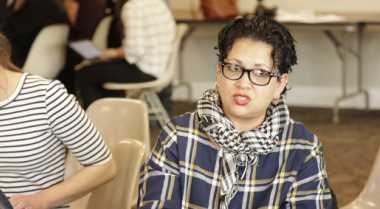The Peacebuilding Commission Convenes to Strengthen the Pacific Regional Response to COVID-19
On 28 July 2020, the Peacebuilding Commission convened the regional meeting on the impact of COVID-19 on peacebuilding and sustaining peace on the Pacific Islands. With this first regional meeting outside of Africa, the Commission continued its path towards utilising its convening capacity to facilitate multi-stakeholder discussions to support peacebuilding efforts in the context of COVID-19.
Ms. Bhagwan Rolls highlighted that the context of climate-induced disasters in the Pacific presents the greatest threat to the livelihoods, security and well-being of the people of the Pacific Islands in a multidimensional and complex manner.
GPPAC’s Chair of the Board, Sharon Bhagwan Rolls, briefed the Commission on how the unique circumstances in the Pacific gave rise to the Peace-Development-Humanitarian (Triple) Nexus approach to peace and security. Echoing the voices of many, Ms. Bhagwan Rolls highlighted that the context of climate-induced disasters in the Pacific presents the greatest threat to the livelihoods, security and well-being of the people of the Pacific Islands in a multidimensional and complex manner. This includes 1) the impact on fishing stocks and sustainable management of ocean resources; 2) the consequences of climate-related displacement; 3) growing inequalities that give rise to communal conflicts. Such a context requires capacities across all dimensions of the Nexus to maintain livelihoods and sustain peace.
Clearly, the situation in the Pacific is multidimensional and complex; however, it also gives rise to some unique good practice examples of partnership and coordination that others could learn from.
However, climate change brings certain conditions that are exacerbated by COVID-19. In the Pacific, as participants highlighted, this includes weak food security, a fragile economic situation, weaknesses of the health sector, high rates of domestic violence and limited opportunities for youth. Misinformation, weak social protection and lockdowns as a result of COVID-19 also pose a serious challenge to peace in the region.
Clearly, the situation in the Pacific is multidimensional and complex; however, it also gives rise to some unique good practice examples of partnership and coordination that others could learn from.
There are several good practices that emerged particularly in response to COVID-19. One of the critical regional undertakings is the Pacific Humanitarian Pathway that provides an enabling political environment and commitment to expedite assistance and cooperation between Member States in preparing for and responding to COVID-19. Local peacebuilding networks, including the Pacific Conference of Churches, have also been very effective in running food security programmes, providing access to adequate information, resolving disputes in the communities and continuing sharing messages of peace and non-violence. The GPPAC Pacific and the Shifting the Power Coalition model of collaboration, with the support and commitment from ActionAid Australia, is the only feminist network that provides financial support to the localisation of humanitarian action through the gender transformative analysis. These examples demonstrate the value of building on existing practices and strengthening a joint comprehensive response across the Triple Nexus.
Partnership and coordination are particularly enabled by the Boe Declaration on Regional Security - a unique framework that pushes for the shift from securitised responses to crises towards human security based on the principles of a people-centered approach and transformative gender analysis. However, it has not yet gained enough political support to drive the regional action across the Triple Nexus and does not have a strong implementation plan.
The participants agreed that COVID-19 presents an opportunity for the region to analyse and assess existing capacities and needs in the region and better coordinate a joint response, align local and government efforts, and integrate gender-sensitive analysis in framing the current response to COVID and any upcoming crises.
In order to do this, Member States in the region identified some of the priorities and roles, moving forward.
The priorities for the Pacific Region in response to the COVID-19 include:
- Committing to building and supporting critical infrastructures for peace, including health infrastructure, and amplify community resilience factors;
- Developing regional capacities to integrate gender- and conflict-sensitive analysis in all actions across the Triple Nexus, including by establishing of a Women’s Mediators Network for the Pacific under the leadership of the Pacific Islands Forum;
- Better mapping of existing efforts to advance peace in the region across the Triple Nexus, including by focusing on local action to avoid repetition and strengthen existing efforts; and
- Ensuring adequate financial support from the international community to move to recovery mode in a manner that is inclusive, conflict- and gender-sensitive.
The role of the United Nations across the three pillars of the Nexus is to ensure that the efforts of the international community are coherent and coordinated, and support Pacific inclusive national ownership, including local community solutions.
As the Commission continues to facilitate dialogue around the response to COVID-19, GPPAC encourages the Commission to follow-up on the ways in which some of these recommendations will be implemented and ensure that various contexts across the globe are given due consideration by the Commission.
